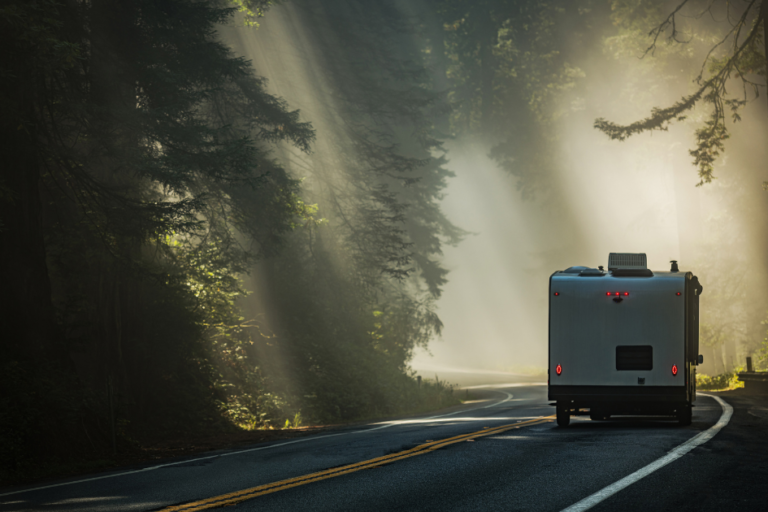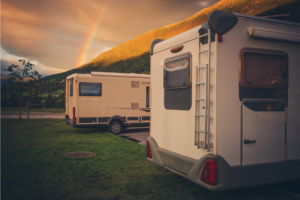With camping season right around the corner, it’s time to start planning your first road trip! Whether you’re driving to a nearby campsite for the weekend or taking on a longer adventure, you’ll want to ensure that your RV is fully equipped for your needs – and that it’s in top shape to get you there safely. With that in mind, here’s our RV setup checklist of essential things to pack and check before hitting the road!
Vehicle Checks
De-winterizing
If this is your first trip of the season, you’re going to want to de-winterize your RV. The safest and easiest way to do this is by booking a Spring service appointment with Christie’s expert service department. Our team will check for any damage, make repairs, and get your trailer road-ready in no time. More of a do-it-yourselfer? That’s great! Here’s our annual summer-izing checklist, to make sure no nook or cranny is neglected.
We recommend getting your RV de-winterized a few weeks prior to your expected departure date, just in case you find an issue that may take a little longer to solve… you don’t want to be servicing your trailer in the frenzied days before your departure, only to find damage that cannot be fixed in time.
Day-Before/Morning-Of Walkaround
So you’ve given your RV its Spring spa treatment and woken up all the necessary systems. You’ve packed (more on this later!), and now it’s the night before departure (or the morning of, you rebel). Here are the things you absolutely must check before turning the key and peeling out. All of these little details seem obvious, but they are the most frequently forgotten checks! While sometimes it might just be funny or embarrassing, these details can also have serious repercussions for your safety (not to mention potential damage to your RV).
Never hit the road before:
- Checking your tires
You probably did this while de-winterizing, but it’s always a good practice to take out your pressure gauge and check each tire before every trip. You do not want to be on the road and feel the sinking sensation (both metaphorical and literal) of a quickly-deflating tire.
- Checking for leaks
As an RV owner, you probably know that water damage happens sometimes, no matter how well your RV was designed or how thoroughly you care for it. You should be checking your RV for signs of water damage regularly, but it’s always a good idea to give it a thorough scan each time you’re headed out. If you do find an issue and end up having to leave a little later, at least you didn’t discover the problem on the road or at your campsite, where you’ll probably be far less equipped to deal with it properly!
- Double-checking your trailer connection
Are you towing? If so, check your tow hitch, and wiring (twice!) before leaving, to ensure that your connection is safe and tight enough. Don’t forget to cross the safety chains on your travel trailer. The importance of this check cannot be stressed enough, as a loose hitch is incredibly dangerous to both yourself and your passengers, as well as everyone else on the road.
- If it pops out, make sure it’s popped and locked in!
Have you ever been on the road and seen an RV drive by with a stairway sticking out or an antenna rattling in the wind? Forgetting these things can be a little embarrassing at best, but quite dangerous at worst. Make sure that all parts that pop or extend or roll out are closed, retracted, and safely locked in place before you start moving. This includes ladders, awnings, automatic stairways, levelling blocks, and pop-out extensions. This will drastically reduce the risk of danger on the road, and minimize the risk of damaging your RV, too.
- Ensuring you’re disconnected from electricity and/or sewer!
Sure, this applies more to when you’re leaving your campsite than when you’re leaving home, but forgetting either of these can cause damage to your trailer hardware (not to mention the potential damage to the hookup) and let’s face it– it can be pretty gross.
Just as you’re checking to make sure nothing is loose or sticking out from your RV before driving away, make sure you’ve safely disconnected from electricity and sewer… trust us, you do not want to forget that!
Beyond ensuring that your rig is properly set up and ready to get you there safely, you’re going to want to make sure that you have everything you need to enjoy your trip, from household essentials to camping equipment.
Packing Checks
Preparing for a vacation doesn’t have to be stressful! With an organized list of packing essentials, you can make sure you have everything you’ll need on the road (and you can totally avoid the pre-departure frenzy by loading up essentials gradually over several days).
It’s true, RV travel means that you must pack more than just a suitcase of your clothing and toiletries. As an RV is essentially a home on wheels, you’re packing all kinds of home essentials that you’d never have to think about if you were staying in a hotel, from bedsheets to spoons.
But don’t worry! We’ve put together a little list of everything you’ll need to make your RV as comfortable as home.
Houseware:
- Bedding (+ extra sets, just in case)
- Extra blankets
- Bath towels
- Hand towels
- RV-safe toilet paper
- Kitchen towels
- Pots and pans
- Cooking utensils
- Oven mitts & hot pads
- Meal plan & groceries
- Plates and bowls
- Mugs and cups
- Cutlery
- Can opener
- Bottle opener
- Dish soap
- Sponges
- Food storage containers, ziplock bags & aluminium foil
- Cleaning supplies (toilet cleaner, all-purpose cleaner, glass cleaner, etc.)
- Trash bags
- Broom and dustpan (or handheld vacuum)
- Pet supplies, if applicable
- Games and entertainment
Important RV-Specific Items:
- Surge protector & electrical adaptors
- Extension chords
- All necessary RV toilet chemicals
- Sewer kit
- Water pressure regulator
- Drinking water hose
- Levelling blocks
- Tire pressure gauge
- Wheel chocks
- Shovel
- Electrical and duct tape
- Extra cotter pins
- Extra motor oil & transmission fluid
- Flashlight
- Battery jumper cables
- Emergency road kit
- Fire extinguisher
- Basic tools
- All necessary documents (license, registration, reservations, etc.)
- Navigation (maps, GPS, etc.)
It’s a lot to think about, but if you take your time packing up and stay organized with a detailed list, you can take the stress out of the equation and hit the road with total confidence, knowing that your RV –and your family– has everything you’ll need. Happy camping!










